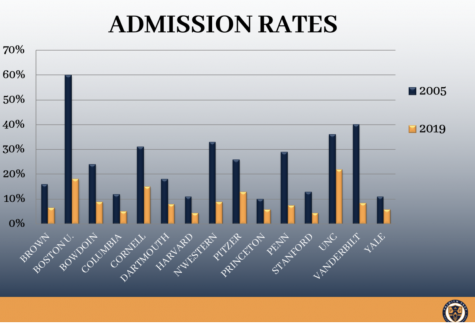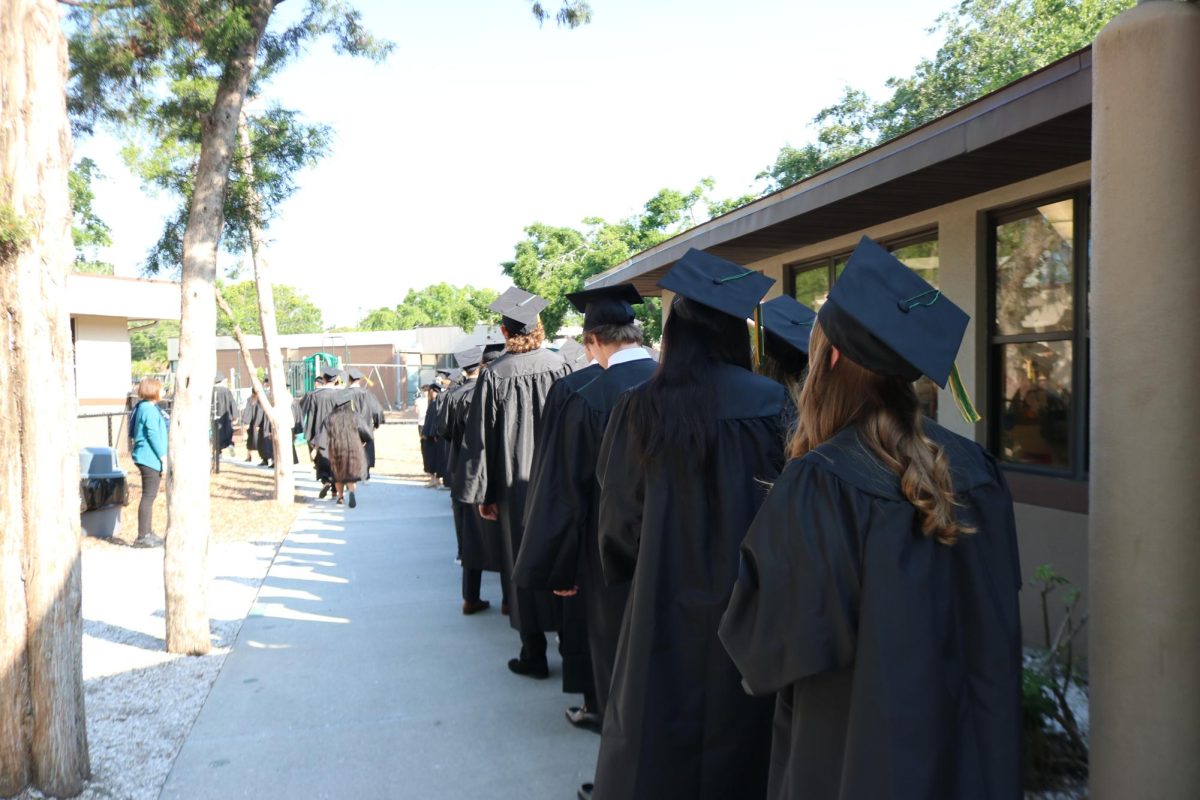The problem with perfectionism
Does the modern school system instill toxic perfectionism in its students by design?
January 19, 2021
High School promotes a certain sense of perfectionism. It’s an environment where success is measured through concrete metrics: an A is good, an F is not. Therefore, for those who value success, grades become paramount, and unless you have been endowed with some divine innate perfection, that means hard work.
Being able to work hard, to a point, is a good skill to have. However, it becomes unhealthy when you stop considering your own boundaries. When the need for success overtakes your life to the point that you would do anything to get a good grade, even sacrifice your own mental health, that’s unhealthy.
Lots of students get trapped in the idea that getting good grades is everything, and to some degree, they’re right. After all, the one thing that is stressed more than anything else in our academic careers is the letter A.
Quite frankly, it’s unhealthy. Or at least, it has been for me.
I think I realized that I had a problem with perfection during winter break, when I got my first semester transcript and SAT scores back in the same week. Both were good, better than I had even hoped for. Even so, I wasn’t happy. I couldn’t shake the feeling that I could have done better.
Too often, mindsets like that get labeled as a positive thing. People think that as long as a student is striving for success, they’re doing it right. Psychologists call this “adaptive perfectionism.” Striving to do our best is good, for ourselves and for society.
But that’s not always true. In my case, success became the only thing I could accept, not something to celebrate. When I didn’t live up to the expectations I had set for myself that were probably too high to begin with, I felt like I had failed myself and everyone around me. That’s toxic perfectionism. Behavioral scientists call it “maladaptive perfectionism.”
Unfortunately, students’ obsessions with success can affect them in more ways than giving them a pretty transcript to show off. Maladaptive perfectionists are more likely to be depressed, anxious, or to suffer with eating disorders.
I have a great deal of anxiety surrounding my academic performance. If I don’t do as well as I wanted to (that means even the difference between an A and an A-) I get sucked into a spiral of self-hatred that usually ends in me convincing myself that I’m stupid and destined for failure. That is, until I get snapped out of it by a better grade.
I know, this is a laughably first-world problem, but it’s a problem that I have spent a great deal of time thinking about. Here is the conclusion that I’ve come to: my need for perfection is a byproduct of a brutally competitive school system.
It’s hard to not see High School as nothing more than a funnel into college. Of course that isn’t all there is to it, but sometimes it can certainly seem that way. My biggest task right now is to get into a good college so I can get into a good grad school so I can get a good job. So yes, there’s a lot on the line here.
All of us are asked to leave the certainty of our family homes to go and climb the first rung on the ladder to the rest of our lives. We can soften the harsh edge of that first rung by choosing a college that we love. Then we read our dream college’s admission statistics, and see that unless we differentiate ourselves from our competition in a major way, we can kiss acceptance goodbye.
Because yes, getting into a good college is more difficult than ever. Just take a look at this infographic, courtesy of Premium Prep College Counseling, which depicts how much more selective colleges have gotten since 2005 alone.

Sometimes, it can seem like it is harder for a student to get into college than for a camel to fit through the eye of a needle (a little Bible reference there for you). So, it stands to reason that I, along with what I can only assume to be many of my peers, struggle with unhealthy perfectionism. Our environment instigates the problem, and for those of us who are naturally competitive, it exacerbates problems that we might already have. It seems like our whole futures are resting on our performance in High School, so we have to get as close to perfect as we possibly can.
What can we do? Well, remember the psychologists’ distinction between adaptive (the good kind) and maladaptive (the bad kind) perfectionism? It turns out that perfectionism isn’t necessarily harmful. It doesn’t have to lead us into dark places. Maladaptive perfectionism is correlated with depression, but the adaptive kind is not. So given the reality of our competitive situation, how can we avoid becoming maladaptive perfectionists?
It’s all about mindset. Cliche, I know, but hear me out. If you can continue to set high goals for yourself and work hard to meet them, but not hate yourself if you don’t, then you’re reaping the benefits of perfectionism without enduring the hardships. Let failure be motivation instead of cause for needless suffering.
One word I found again and again in my research was flexibility. It’s important, in a competitive world that lends itself to maladaptive perfectionism, to be able to go easy on yourself.
But it can also help a great deal to talk with other people about the pressure you feel. In 2016, a Ph. D. student named Angela Garrison published the results of her research on perfectionism among college students. She discovered that students with maladaptive perfectionism had a lot of trouble talking about their feelings. Their need to be perfect seemed to make them unable to disclose things they were ashamed of, like getting a bad grade. In discussing her research, she repeatedly used words like “emotional disclosure” (a positive coping mechanism) and “emotional avoidance” (a negative one).
So if emotional disclosure can help us, let’s do it. Even if you feel that you have no power over your situation, you can always at least talk about it with someone you trust. Or, you could discuss it in an article for your school newspaper like I’m about to do.
I spend way more time doing schoolwork than is actually warranted a good majority of the time. I wake up early so I can get some extra study time in before school, no matter how sleep deprived I may be. Truth is, I would sacrifice almost anything to get a good grade. I spend upwards of three hours every weekend doing extra credit assignments alone, let alone my other homework. I’m afraid to participate in any academic extracurricular because I know that if I’m not immediately good at them I won’t be able to take it. Then, as a result of that, I feel like a failure for not doing enough to get into college.
Maybe that sounds excessive, and that’s because it is. I’m sixteen. This is the time of my life that I’m supposed to be free, and I am very aware of the fact that I don’t feel free at all. I can’t shake the feeling that life isn’t supposed to be this way.
I can’t change the school system, but like I mentioned before, I can change my mindset.
I know it may sound hypocritical coming from me considering that I haven’t exactly succeeded in this yet, but try to realize that there is more to life than getting into the perfect college. If you can’t recognize that, college will be to grad school as high school is to college, and so on and so forth.
Further, remember that the college you are working so hard to get into now is not everything. No matter the college you go to, there will be plenty of opportunities for success for those students who are dedicated to their work. In the words of author Frank Bruni, “Where you go is not who you’ll be”. Check out this article by my fellow Gauntlet member Sanna Lexhed that discusses this very topic if you want to hear more about it.
Striving for success is important, but so is taking care of yourself. If you think that your relationship with academic success is unhealthy for you, try to take a few steps back. I promise you, one bad grade won’t affect your entire life. Remember that absolutely nobody is perfect, so it’s completely unreasonable to expect yourself to be.
If you would like to learn more about perfectionism and its effects on students, you can check out this study that I used to research for this article. If you think that you might be struggling with some sort of negative perfectionism, here is a quiz you can take on Psychology Today to find out.
Above all, though, remember that whenever you feel like school is too much, you aren’t alone.


























































